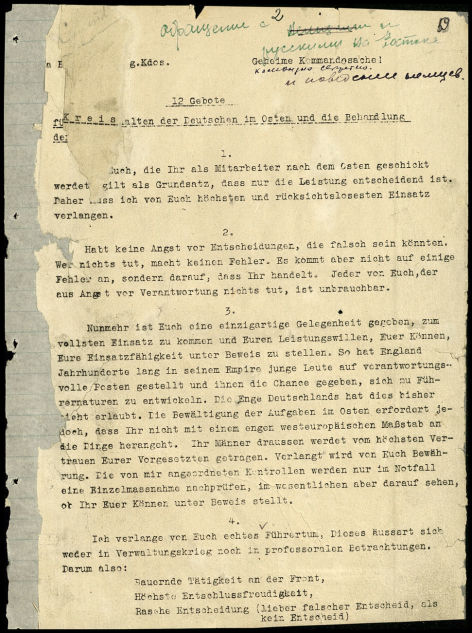On 14 February 1946, Lev Smirnov, the assistant chief prosecutor for the USSR, presented to the Tribunal evidence of crimes against the civilian population of the Soviet Union. Among documents presented were secret instructions dated 1 June 1941 issued by Herbert Backe, state secretary of the Reich’s Ministry for Food and Agriculture, on how officials should conduct themselves in the territory intended for occupation of the USSR.
“Secret Command Issue.
The Twelve Commandments for the Behaviour of Germans in the East and for Their Treatment of the Russians.
1st Commandment: Those of you who are sent to work in the East must adopt as your guiding principle the rule that output alone is decisive. I must ask you to devote your hardest and most unsparing efforts to this end.
(...)
6th Commandment: Since the newly incorporated territories must be secured permanently to Germany and Europe, much will depend on how you establish yourself there.... Lack of character in individuals will constitute a definite ground for removing them from their work. Anyone recalled for this reason can never again occupy a responsible position in the Reich.
(...)
8th Commandment: Do not talk – act! You can never talk a Russian around or persuade him with words. He can talk better than you can, for he is a born 'dialectic'…
Fewer words and less debate. The key is to act. A Russian is only impressed by action, for he is feminine and sentimental by nature. "Our country is great and plentiful, but there is no order in it, come and own us." This saying appeared at the start of the formation of the Russian state when the Russians were calling on the Normans to come and rule over them. This attitude runs through all periods of Russian history: the domination of the Mongols, the domination of the Poles and Lithuanians, the autocracy of the Tsars and the domination of the Germans, right up to Lenin and Stalin.
Russians want to be a people who are ruled. That is how they will perceive the coming of the Germans as well, for that coming corresponds with their desire.
In particular, do not be soft and sentimental. If you cry with a Russian, he will be happy, because afterwards, he will be able to despise you. Being feminine by nature, Russians want to find a vice in the manly as well, so that they can despise the manly. So, always be manly, maintain your Nordic fortitude.
Only your will must decide, but this will must be directed to the execution of great tasks. Only in this case will it be ethical even in its cruelty. Keep away from the Russians – they are not Germans, they are Slavs.
Don't have any drinks with the Russians. Do not get involved in any way with the women and girls of your subordinate enterprises. If you stoop to their level, you will lose your authority in the eyes of the Russians. From centuries of experience, the Russian sees the German as a superior being. Take care to maintain this belief as a German. Elevate it with your calm, business-like orders, firm decisions, ridiculing debaters and ignoramuses.
(...)
9th Commandment:
Do not be infected by the Communist spirit. The youth of Russia have been brought up in the Communist spirit for two decades. They are unfamiliar with a different upbringing so it would be pointless to punish them for the past.
We do not wish to convert the Russians to National Socialism; we wish only to make them a tool in our hands.
You must win the youth of Russia by assigning them their task – by taking them firmly in hand and administering ruthless punishment to those who practise sabotage or fail to accomplish the work expected of them.
(...)
Russia has always been a country of bribery, denunciation, and byzantine influence. This danger can penetrate you, especially through emigrants, interpreters, etc. Russians in positions of authority - as well as business managers, senior workers and supervisors - always show a propensity to bribe and extort bribes from their subordinates. Stop bribery and be incorruptible and correct, at all times.
(...)
11th Commandment: The Russian has been enduring poverty, hunger and frugality for many centuries. His stomach is elastic, therefore – no false pity for him!
(…)
Do not try to make changes to the Russian way of life by adapting it to the German standard of living”.
























